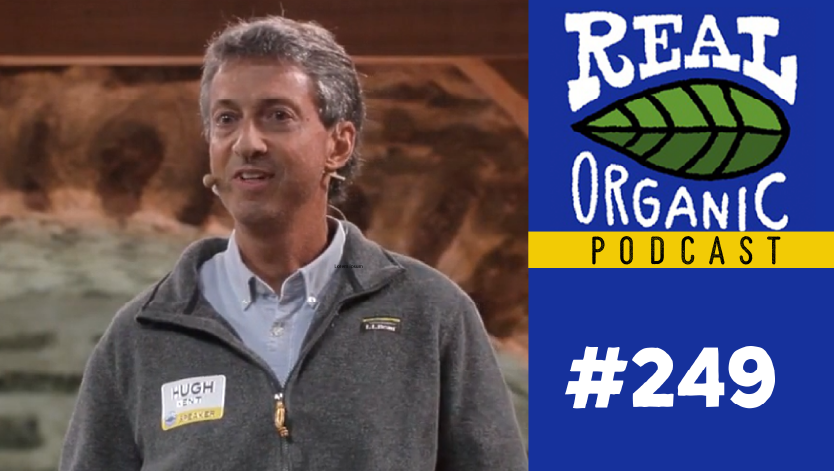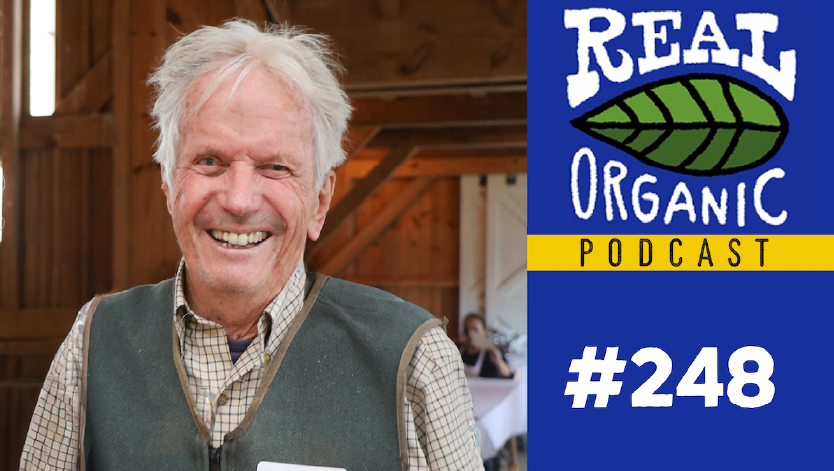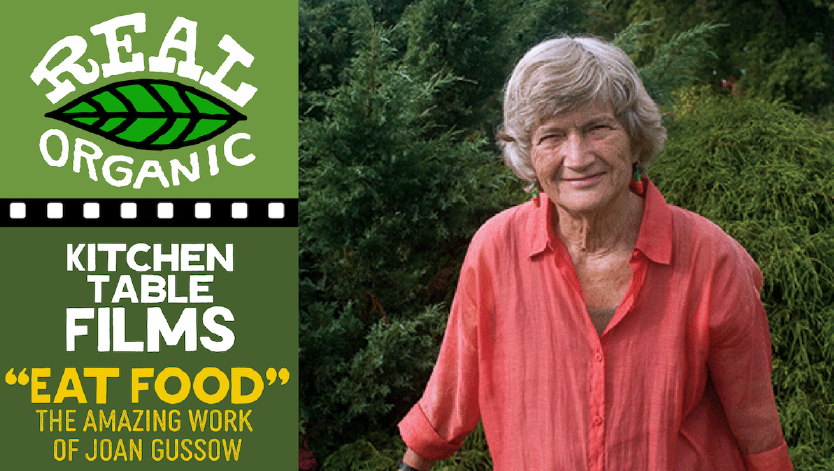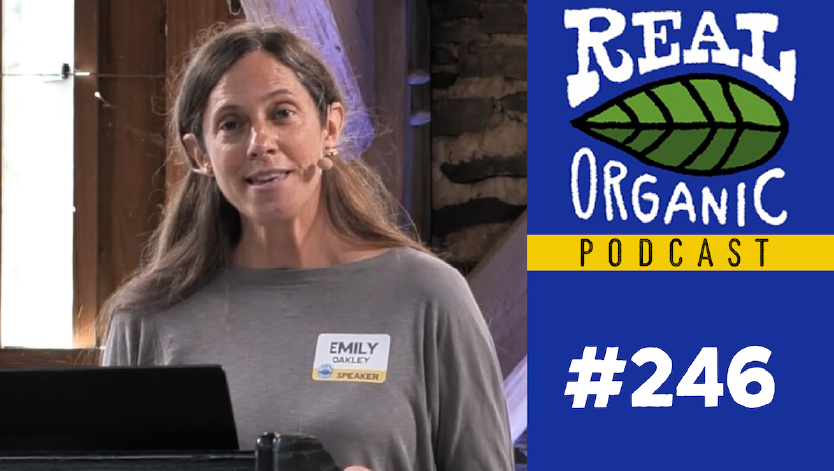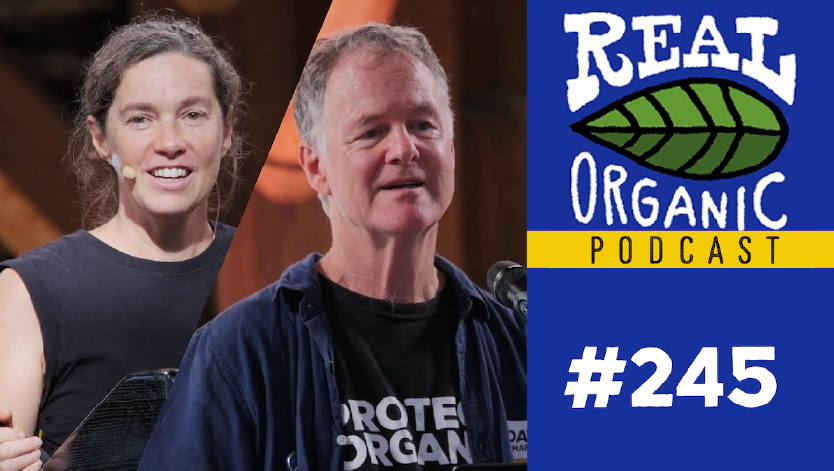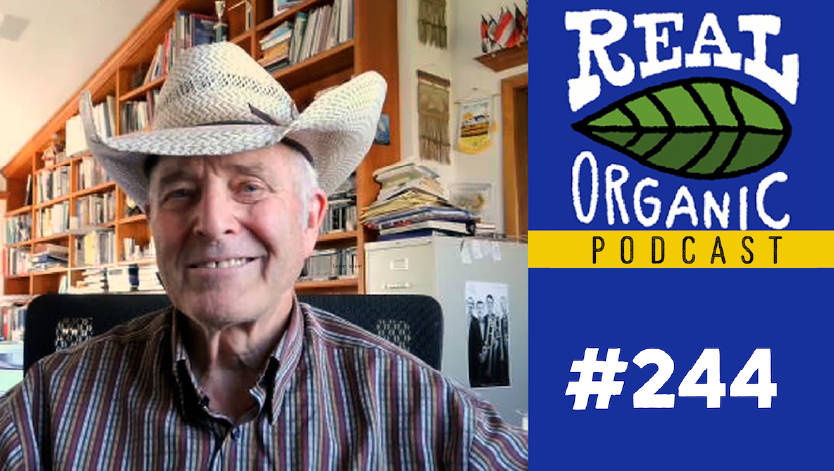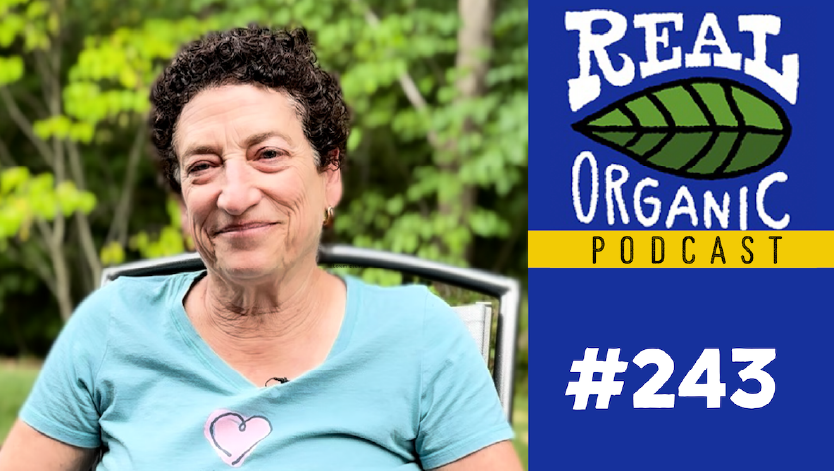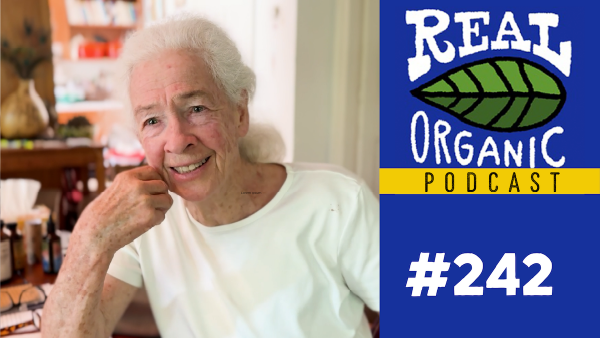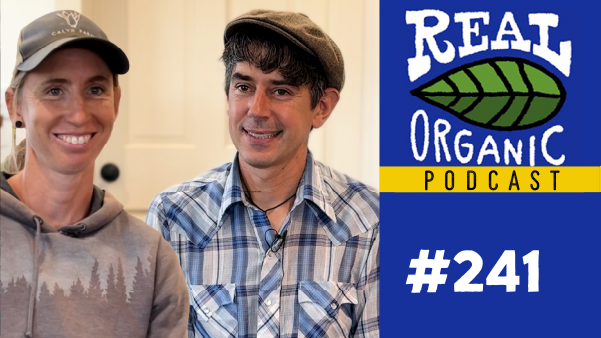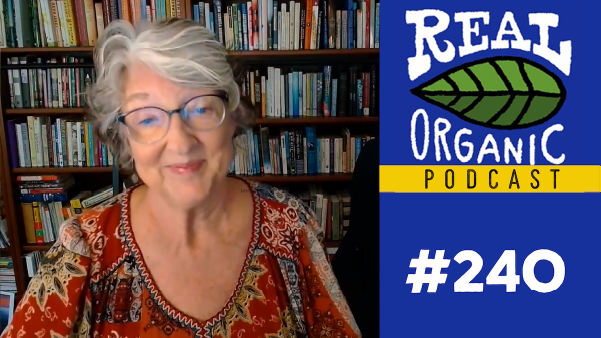Episode #219
Hugh Kent: Hydroponics Is Not Organic Farming
Florida blueberry farmer Hugh Kent returns to lay bare the hard truth: hydroponics is not organic farming. Hugh explains how soil-grown berries create healthier plants, richer flavors, and true organic integrity, while hydroponic systems — plastic pots and synthetic feeds — cut corners and replace real organic food on grocery shelves. Hugh warns that industrial hydroponic berries are not adding to the organic supply – they’re replacing it. This conversation dives into soil health, flavor, nutrition, and why we must protect the meaning of organic before it’s lost.
Our Hugh Kent interview has been edited and condensed for clarity:
You can subscribe and download episodes of our show through your favorite podcast app, our YouTube channel, or stream the audio-only version here:
Dave Chapman interviews Hugh Kents at King Grove Farm, April 2025
Dave Chapman 0:00
Welcome to the Real Organic Podcast. I am back here in Eustis, Florida, talking to my good friend Hugh Kent of King Grove Organic Farm. Hugh, you’re very generous to bring me in. I know your harvest is just beginning because we ate some incredible blueberries for dinner last night. In fact, I stuffed myself walking around the fields – really good. This was especially a fun trip because Ladd Harris was here. He’s the wellness coach from the Houston Texans, an NFL team. You’ve been selling blueberries to them. That’s another story. Maybe we’ll touch on it. But anyway, thank you for making some time on a busy day.
Dave Chapman 0:50
We’ve talked a lot about politics, and I actually want to talk a little bit more about politics, but I thought it’d be fun today to start with talking about how you farm organically. You gave Ladd a lot of beautiful explanations, and I was privileged to just sit and listen as we walked around the fields. Could you talk about the evolution of your understanding of organic as a farmer? How many years have you been doing this?
Hugh Kent 1:24
About 15 years.
Dave Chapman 1:25
About 15 years. I will say, I believe that you’re a phenomenal farmer. I have nothing but respect. I’m awed by the miracle of your plants, fields, and soils. I know you started with basically beach sand.
Hugh Kent 1:42
Yeah. I’m awed by them.
Dave Chapman 1:45
Tell me about it. What’s that been like for you? What have you learned? What’s happened?
Hugh Kent 1:53
It’s fascinating for me. I’ve learned how little I know, and I’ve learned to trust the natural processes out here. That’s been an extraordinary personal evolution for me because I thought I had to learn more than I did. I do less and less interference in the way the plants grow naturally than I thought would ever be possible. So I started out thinking I had to learn the names of everything that was going on out there. I needed to learn all of the weed species, the Latin, and every pest that was out there. I thought that was achievable. Now, I don’t think it even is, but it’s a much simpler approach than I thought it ever would be.
Hugh Kent 2:42
I have a very simple philosophy on how to farm organically, which is to get out of the way as much as possible and let all the natural systems work. It’s based on just creating as much biodiversity as I can in and around the farm. Not just in and among the plants themselves, but on the fringes of the active parts of the farm. Allowing the woodlands, wetlands, and wildlife that we curate as part of our organic farm obligations – which are supposed to be part of organic agriculture – to collaborate with what’s going on with the crop plants, what we’re actually paid to grow. It works incredibly well.
Hugh Kent 3:28
But without as much planning as I thought, there’s so many natural systems that balance themselves and seem to want to create good food for us. I’m always shocked at how the farm takes care of itself in a lot of ways. I often think about the interview you did with Hans Herren, which was fascinating to me and helped me. In retrospect, I look back at what I’ve been doing, and a lot of things made more sense. Hans Herren, of course, was famous for many things, but one was for saving millions of lives as a result of addressing a mealybug outbreak in the cassava crop in Africa. There was widespread famine – millions of people were affected by this.
Hugh Kent 4:17
It was caused by a mealybug, which was an invasive species which came from another part of the world. It had no natural predators in Africa. He had to first go find the pest so he could identify what might predate on it in its native areas. He found it in South America, and he found the natural predators in South America. Then he ultimately brought them to Africa, where he introduced them, and they very quickly controlled the invasive mealybug that was decimating the crop.
Hugh Kent 4:49
To take that huge, significant example and reduce it down to what I see on my small, little farm, the parallel is that I believe there are almost limitless beneficials that live on our farm – beneficial animals, insects, and microbes. If you look in the academic literature, that’s not true. You’ll see ladybugs and spiders, that kind of thing. Also, you have four beneficials to work with. I don’t think that’s true. I think that all of these creatures are related to each other and want to be in balance. If we don’t throw them out of balance too much, they often come back to a stasis that works very well.
Hugh Kent 5:39
If I have an infestation or something gets out of control, as long as I have a small baseline of the predators, a nursery, and some of them living out here – I don’t have to get them from South America – their population is going to increase in lockstep with the infestation. There’s more of the food source for them, their population increases, and they take care of the infestation. I’ve seen this over and over again with organisms which are not considered to be beneficials. I think I told Dad this story about the Diaprepes root weevil. There’s a grub that can wipe out citrus groves, and it has all over Florida, especially in this region, when it used to be a citrus region.
Dave Chapman 6:24
Could you describe the grub? I really enjoyed that.
Hugh Kent 6:28
The adult stage is a fly that’s not very big, but the larval stage is this grotesque grub that’s the size of something between a pinky and a thumb, depending on how big your hand is. It’s a really big, grotesque, translucent, fat, slow-moving, yucky thing. But they’re just voracious eaters and they’re left over in land that used to be citrus, as this farm was. So, when I first started, I saw these things everywhere – maybe a year or after two years, maybe after we started with the blueberries. I thought, “Well, we’re done.” I talked to the academics. “Well, you can fumigate with this, but it probably won’t work very well.” I’m like, “No, I can’t. I’m organic. I can’t fumigate with that.” “Well, you’re in trouble.”
Hugh Kent 7:25
Then shortly after that, I noticed we had a huge population of earwigs. I thought, “Oh, no. It’s like Diaprepes root weevil grubs and earwigs.” Some of the crew were complaining, “Earwigs are biting us.” I went to the internet. There’s no huge harm created by earwigs. They’re not there to eat the plants. But I just saw their population increasing too. They’re like, “What in the world? What’s next?” Then, just through observation, I realized there was something going on between the root weevils and the earwigs. I got a Ziploc bag, and I put an earwig in there, three Diaprepes root weevils, and a few blueberry leaves. I sealed it up, and almost instantly, it was like Mutual of Omaha. It was disgusting.
Hugh Kent 8:20
I didn’t realize this, but earwigs will act like scorpions. The earwig saunters over to the nearest weevil and throws his tail over his head with those pinchers on the back and stabs the grub. It was shocking. “Wow. I had no idea.” There was not anything I could find anywhere on the internet about earwigs being predators or beneficials. Sure enough, in the morning, there were three dead root weevil grubs and one eating and happy earwig. I realized, “This problem is going to take care of itself.” And it did. It was extraordinary. The earwig population continued to increase for a little while, and then it petered out, and the root weevils were virtually completely gone. That’s just an example, but I see this continually.
Dave Chapman 9:17
It’s also an example of you went to the academics, extension, and the universities to try and get an answer to a problem that was looking like a very serious problem, and they actually didn’t have an idea. Now, if you’d gone to Hans Herren, he might have said something similar, but the point being the whole institution that we pay for with our tax dollars to help farmers solve problems and create abundant crops thinks differently from the way you think now. It thinks, “What can we spray to kill this problem?”
Hugh Kent 10:04
It’s all based on toxins. So, if we have a problem, what pesticide can we use to address the problem? Of course, there’s all kinds of consequences to that, because a lot of these are broad-spectrum chemistries, and you wipe out other creatures that are there to keep something else in balance. Then now you have another problem. Now. Now you got to go chase that with a different chemical. Now another one. You get on this chemical treadmill.
Hugh Kent 10:33
This was brought home to me, actually, early on in my education about this by Marvin Pritts, a Cornell ag professor. I saw him give an organic seminar. He talked about conventional blueberry farms in New Jersey as examples that became Superfund sites because they got on these chemical treadmills where they’re just throwing one chemical after another. Throwing things out of balance and now needing another one and just on this treadmill – more and more and more and more – until they’re Superfund sites. I see that in all kinds of agriculture, and it’s just like a crying shame. It’s just not necessary.
Hugh Kent 11:13
We can grow food, and we can feed the world. Organic systems work. They’re probably the only thing that does work and can continue to work and don’t rely on us destroying the land’s capability to produce food for us, because ultimately, that’s what happens, and we just interfere with it too much and with too much chemistry. We’ve seen that over and over. We see that in agronomic crops and in fruits and vegetables. It’s not something limited to blueberries.
Dave Chapman 11:42
The whole thing gets more and more extreme. The so-called solutions keep creating bigger problems and just keep ratcheting.
Hugh Kent 11:51
I’ll give you another example: blueberry gall midge. That’s an insect pest of blueberries. Now we’re being told that this is no longer a great region for growing blueberries because if farms get any kind of age on them, they get blueberry gall midge infestations. The same people who are telling this to us are giving us chemical solutions and saying, “Well, spray for blueberry gall midge.” But that’s what they’ve been recommending for quite a while. Well, apparently it doesn’t work even in their own assessment. I had blueberry gall midge for a year, and now it’s gone. I didn’t do anything for it. Why is it gone? Same thing for some very destructive fruit flies. The recommendation from the academics is to spray prophylactically. Spray before you see a problem in your field of these fruit flies.
Dave Chapman 12:45
The spotted wings or something?
Hugh Kent 12:49
Spray in a prophylactic program, so preventatively every five to seven days in a rotation. But I know there are still farms in this region that struggle with that, that do follow that lockstep. We haven’t had that pest since the first year it showed up here. My belief is that something that predates on it was here in some small numbers, and then in response to an infestation of an imbalance, a species that gets out of whack and grows too quickly and then the predator responded with its population, and then things came back into balance. I have no other explanation for it. I’m not a great farmer. I’m not a farmer by training. My education is a lawyer. What I did learn was observation and critical thought.
Hugh Kent 13:47
I thought I had to approach all of this with memorization and with getting a handle on “What would be some of the organic substitutes for basically a chemical program?” I would have to learn each and every one of these possible pests and the way to control them with a less toxic form of intervention. But I’ve become so much more hands-off, and because I’ve just observed this well, these things are finding their way back to a balance. If I don’t interfere too much, that’s what’s going to happen. That’s the only explanation for this. Weeds are another example. I was told that you couldn’t have a farming system like this, where you allow what wants to grow there to grow.
Dave Chapman 14:39
We’ve talked about it before, but could you explain your living mulch system?
Hugh Kent 14:45
Classically in blueberries – whether they’re conventionally grown or organic in this region, in the southeast or in Mexico, Chile, or Peru, which have warmer weather blueberry varieties – we’re told you have to have a completely weed-free environment. There can be no other plants. Weeds are just a plant out of place. But you can’t have any other plants competing with your blueberries. Conventionally, it’s done with herbicides and with an organic system of plastic. Contrary to what the law says, all these big farms in Mexico, Chile, and Peru – they use plastic. They cover the ground in plastic. They put these plants in plastic pots. This is the hydroponic system that most real organic people know about. It’s anathema to most of us. It also directly violates the law, but that’s how most of these organic berries are being grown now.
Hugh Kent 15:41
The weeds are kept out, either chemically or through the use of plastics. That’s not what we do here. We welcome them. They actually are part of our growing system. Whatever grows in the middles – in between the rows of plants – is mowed and mulched and goes up onto the plant using machinery that we designed and fabricated. Simple stuff – fancy lawn mowers, basically. That organic matter breaks down on the blueberry beds, and through that decomposition provides the food for the microbes, which provides the food for the plants. We’re feeding our plants with the weeds – the other plants that grow right with them. I did cover crop for a couple of times, where I planted what grew there between the blueberries – in and among the blueberries.
Hugh Kent 16:42
That worked, but it didn’t work as well. Instead, I decided to just let what wanted to grow there grow there. There’s a wide variety of plants out of place there – of weeds. All sorts of stuff. There’s another thing; I thought I needed to learn all the Latin names of those weeds too. No, I don’t. I can trust that nature knows what the soil needs and is growing the plants that are required to improve soil over time. That’s what nature does – trying to improve soil over time. If we go look at the undisturbed parts of this land, it’s the most beautiful. It’s the forest out here. It’s the lowlands and the wetlands back there that have been untouched. They have naturally evolved. Nobody goes out and fertilizes or irrigates them. They’re extraordinarily high-quality soil. The life that’s in the old-growth woods here is extraordinary – just amazing and very healthy.
Hugh Kent 17:40
I believe what’s going on with all these different plants, these weeds, and the blueberry plants and the living soil is that they’re all working together in a complex system we really don’t have the capacity to understand. So we can only identify between 1% and 10% of the microbes in soil. We don’t know what they do, we don’t know what to call them, and we don’t know what their nature names are, but we know they’re working in this incredibly complex natural system. They’re working with the plants. You don’t really have soil with just microbes; you have to have the plants’ participation in it also because they’re taking the energy from the sun and water, and they’re photosynthesizing – that’s a miracle in itself.
Hugh Kent 18:30
Then, through photosynthesis, they’re translocating the products of their photosynthesis down into the soil and the root tip exudates, exuding that, attracting the microbes, trading with the microbes, and feeding the microbes. Now the microbes go out and do their work. They go out and forage for what the plant needs and change the plant’s chemistry in response to what it’s finding in its environment, whether it’s to change its chemistry, repel pests, or whatever it needs. As long as there’s enough biodiversity there, the plant and the microbes collaborate. All this stuff collaborates – all collaborates in a way that we are way too ignorant to understand.
Hugh Kent 19:20
I do believe that that’s when you get the healthiest soil is when you have a whole different community of weeds out there. You’ve been out there; there’s all kinds of stuff I can’t even identify. But it’s all working. I give the blueberries a competitive advantage by doing this mowing, and then this biomass that we put up on the bed for blueberries, so that’s the primary source of nutrition for them, as that breaks down and feeds the microbes in the soil.
Dave Chapman 19:48
Let me ask a farmer’s question, which is: what you just said is beautiful and brilliant. But what happens to your yields when you do this? Because I think all the advisors would say, “Hugh, you’re going to go out of business because you’re going to have such depressed yields from all this competition.” What has happened with your yields?
Hugh Kent 20:14
I was very worried about that. Our yields are every year, well in excess of the state average for blueberries in Florida. We have generally low-yielding varieties because I didn’t know what I was doing when I selected the varieties. But for sure, yield is not the problem. Our problem is our farms and plants are getting old. They’re twice the age that they’re usually expected to last in a conventional system.
Dave Chapman 20:43
I just walked around yesterday and saw a beautiful crop on these old plants. There’s some magic there.
Hugh Kent 20:51
Yes, absolutely. I was told, “No, you can’t do that. You can’t allow other plants to compete with your blueberry plants. They won’t yield.” “Well, no. They do. They yield better.”
Dave Chapman 21:03
And they taste better.
Hugh Kent 21:04
They definitely taste better. I’m convinced it’s because they have the capacity to select from a much wider buffet of microbes, minerals, and nutrients in the soil. They can pick and choose what they need. They have the intelligence to do that. They’re evolved to do that, so long as you give them all of that to choose from. Through the work of people like William Lee, we’re understanding the level of their sophistication in doing that. An example is ellagic acid. Ellagic acid is produced by tomato plants and by blueberry plants in response to insects nibbling on their leaves and stems.
Hugh Kent 21:51
You’d think that’s a bad thing, but as long as it doesn’t get out of control – all the mild stresses that are good for us – that mild stress induces the plant to produce ellagic acid in response and to repel the pest and to protect itself. It puts that ellagic acid in the fruit also. We eat the fruit, and those elevated levels of ellagic acid are one of the most important, health-providing bioactive compounds there is. I leave it to people like William Lee to explain just how good ellagic acid is for us and how important it is for our health. But that’s where it comes from. I believe that’s where other antioxidants come from.
Hugh Kent 22:42
It comes from the plant’s natural ability and desire to preserve its own DNA, its own berries, its own fruit, whatever the crop is. The blueberry plants have a competitive advantage in making their fruit last longer so that they can be propagated in whatever way nature would naturally provide, whether it’s through birds or something like that. We interfere by going in there and collecting the food for ourselves, but there’s still a drive for the plant to preserve its own fruit with natural preservatives. Those antioxidants that it produces to preserve its own fruit are the same ones that are so good for us.
Hugh Kent 23:27
When people say, “Hugh, your blueberries last so long. We buy them and they’ve been abused by UPS for a couple of days, and we get them put in my refrigerator, and they’re safe. They stay fresh for more than a month.” We hear that all the time. We’re insulted because we think you should be eating them within a couple of days. But some people experiment and they say, “Oh, I did this experiment. I left a small handful in the back of my fridge for a month. They’re still great.” That makes us feel really good. We used to pat ourselves on the back and say, “Oh, that’s because we’re so good at post-harvest handling.” We chill our berries within a couple of hours to 34 degrees, which is not the industrial process.
Hugh Kent 24:08
Instead of a couple of days later, we’re getting them out of the field, sorted and packed, and into the coolers, and then after a couple of hours they’re headed down to 34 degrees, which happens later on in that afternoon, usually. We thought, “Well, that’s where the shelf life, longevity, and the extended freshness come from.” But I don’t think that anymore. I think that’s a big part of it, but I think what’s really going on is we’re growing in a system where the plant is allowed to produce the level of antioxidants that it really is naturally programmed to. If you do that, then the antioxidants that are so good for us, they’re the same ones that make that berry last.
Dave Chapman 24:44
It’s so significant. The first time I read about the superior nutrition of organic food, and they said it’s mainly a result of the fact that the plants are more stressed and they produce these compounds, I thought, “Well, you know, that’s great, but then that means that they have lower yields because they’re all these things stressing.” I’m coming to see it’s not lower yields. It is a natural system thriving. When you create a plant that has no stress, that’s very unnatural. That’s just not natural.
Hugh Kent 25:21
It’s a level of stress, though; you can stress them way too much. It’s just like our own experience in living as a human. Too much stress will kill us. But I think also no stress is perhaps not good for us. The little things in life that we find uncomfortable, annoying, or demotivating, those are perhaps good for us. But too much is bad. You have to find the balance.
Dave Chapman 25:49
I just want to say one thing that I also thought back at the beginning, when you talked about that you see the farm – productive part of the farm, the part where you harvest a crop – that what happens in the acreage around that is very significant. I have noticed something – actually, I noticed it in the hydroponic people. They said, “Yes. We absolutely have set aside this land over here in order to take care of nature, but our actual farm is completely unnatural.” You’re saying it’s not like people who buy carbon credits. It’s, “Okay. I’m going to fly, but I’m going to buy carbon credits that’s going to be invested in the Amazon rainforest to preserve it.” Wonderful. That’s a good thing to do if you fly a lot. But the point is, it’s not like paying a tax. It’s creating the system, and it’s all part of the system.
Hugh Kent 26:46
Exactly. It’s not a trade-off. We’re not saying that because we’re doing something environmentally destructive here, we’ll do something beneficial over there. No, it’s not that at all. It’s integrating them. I think the people who came up with the organic regulations knew what they were talking about. They said you need to steward the woodlands, wetlands, and wildlife. That’s a requirement for the farm plan that we all have to put together when we get our farm certified. It’s not that we were supposed to go out and do this independently; it’s tapping into this wisdom of nature that we don’t understand and having this nursery of things which are available to help you with your crop.
Hugh Kent 27:36
They work in balance with it. This is not a monoculture. I would describe those hydroponic berry farms as monocultures. This is not a monoculture. We only get paid for one crop. But that doesn’t mean that’s the only thing we’re growing or the only thing we’re growing intentionally. We grow a lot of things intentionally and inadvertently here. The weeds that I was describing that grow in and among the blueberry plants, we’re intentionally allowing that. But we’re still stewarding it. We’re not going out and eliminating it. It wants to be there; let’s allow it to be there.
Hugh Kent 28:21
Same thing on the edges of the farm. We have wildflowers, for example. They would occur there naturally, but we do steward them. We have a much higher population of wildflowers, I think, than we would if we just left it to its own devices. We are careful with the timing of mowing and so forth. Through that, we’ve learned that we increase the farms capacity to carry some pests like thrips. They’ll go over as banker plants – they’ll go over to the wildflowers. They’ll leave the blueberries alone. The bees need them and like them. The different pollinators are here for that reason and other pollinators that have developed here and live in the woods and wetlands around here also.
Hugh Kent 29:12
We’re basically encouraging a small ecosystem here to thrive. The overlying philosophy, I think, is to interfere as little as possible. When I started, I thought, this wouldn’t work; I have to intervene all the time. Now, I see the results of it, and they’re beautiful. The food’s wonderful. It’s very productive. The yields are high. It’s healthy for the people who work here, it’s healthy for everything else that lives here, and it’s sustainable – to use that overused word. But you could farm like this, not just for blueberries, for lots of other things. This is the crying shame of it.
Hugh Kent 29:53
For me, I see this as an observer, and I see how beautiful, intricate, complex, and interrelated all this is. I don’t have to understand it even. I just have to allow it. I just have to be willing to observe it, not panic about it. I don’t think there’s that many of these farms left now. This philosophy is disappearing under the weight of industrial farming because of the economies of leverage in the marketplace for these huge, huge farms. We could do it this way. We don’t have to use toxins for everything.
Dave Chapman 30:38
The amazing thing in your example, which is your life, is that it’s not less productive. It’s not actually more expensive. The challenges are trying to negotiate the marketplace because the no man’s land is not a bunch of independent stores and independent farms competing, “My farm is going to spray the hell out of everything.” “Okay, your farm has this natural thing.” And “Okay, we’ll see.” Maybe your farm is outproducing my farm because I’m actually slowly killing the system every year that I do that. Yet, that system is thriving financially, if not biologically; and your system is struggling financially, but not biologically.
Hugh Kent 31:36
That’s a scary reality because where does that mean we go? That means the ones that are prospering financially multiply. That’s what we get, and it pushes out the ones that financially struggle. That’s where we’re headed. That’s why this is all accelerating. I’ll give you an example of what happened with blueberries in Florida when I started doing this. I started as organic from the beginning, but a lot of farms didn’t. They saw a price premium, where consumers were reacting to quality, taste, nutrition, just pesticide-free food, personal safety, and health. They started pushing up the price of organics.
Hugh Kent 32:26
What started to happen was what should happen. A lot of the conventional farms in this area started to transition to organic, which is a very hard thing to do if you’re respecting the law – you have to farm organically for three years before you can label your product and sell it as organic. They meant these guys had to learn a new system; they had to use organic inputs; their plants go through a shock, actually. I’ve heard this and saw this over and over, which is, if you treat a blueberry plant conventionally, they’re used to being spoon-fed, they’re getting everything prepackaged for them, and they’re getting ultra-processed food. It takes them a while to learn, evolve, and work with the microbes in the soil instead. They go through a bit of a shock. So, they stagger for a year or two, and the farmer is going through all this extra expense and not getting any benefit from it till the third year.
Hugh Kent 33:31
But they were doing it. I had a lot of guys come and see me. They were interested; they heard that I was doing it, and they wanted to know more, and this was picking up momentum. I remember the day really clearly. I went to an extension meeting, and somebody stood up – a nursery grower who was supplying plants to the industry – and said, “Hey, there’s a new way of doing organics.” Container growing, which is hydroponic. The industry likes to call it container, but it’s hydroponic. It’s a plastic container, a plastic bag, or a plastic pot. An inert substrate in there, coconut husks or something similar, not living soil. A hydroponic solution is dripped through there. That liquid solution contains some major NPK and some trace minerals, and they can grow a plant that way. They don’t have weed pressure because weed pressure is a factor. The plants grow like crazy.
Dave Chapman 34:32
Especially in Florida.
Hugh Kent 34:33
Oh, yeah. They just grow like… It’s just nuts. They become root bound very quickly, and they have to throw the whole thing out after four or five years, and then it goes in the landfill along with all the plastic mulch they have underneath the plastic bags, plastic buckets, and so forth. But this was touted in this meeting as being a way to get around the three-year transition period. You don’t need a transition period. You can go out and do this right now. You can go out and laser level a field, compact it – which makes it unsuitable for farming – and cover it in plastic ground cover, put your plants in the plastic pots, turn on your fertigation system, and there you go; instant organic farm. That’s what took over.
Hugh Kent 35:19
These poor guys were going through the transition period where they’re taking soil-based conventional farms and transitioning them into organic. That was it for them. They were done. What’s quite disturbing is that the industry is allowed to say without being refuted at all, “We’re growing more organics for people.” Look at all these organics coming out of Mexico, Chile, and Peru – these container hydro systems. “Organics for everybody; affordable organics.” They’re not organic; they’re hydroponic. They’re not in addition to soil-grown organic. They’re not increasing the pool of available organic food; they are replacing actual organic food.
Dave Chapman 36:06
Why is it replacing organic?
Hugh Kent 36:09
Because it’s much cheaper. There are initial capital costs in creating a farm like that, but these huge companies are good at that. They got a lot of capital to start with. Once you’ve done that, now it’s a very cheap system. If you don’t take into account the externalities, which include things like covering enormous acreage with plastic and growing in coconut husks that come from Sri Lanka – halfway around the world – to South America, and then you grow them for four or five years, and then the entire thing goes into the landfills where it can’t be recycled. This kind of plastic can’t be recycled. All this stuff gets trashed, and then they do it again.
Hugh Kent 36:46
This is happening at an enormous scale. This is all well-documented. These valleys in Mexico where they’re usurping the land, Mexican farmers water, and their labor. They’re putting Mexican farms out of business. They like to hire Honduran and Guatemalan laborers because they come cheaper than Mexican labor does. They pay $1 an hour. That’s the wage scale in Central and South America that we compete against – $1 an hour. These are enormous industrial farms, and they call themselves ‘organic.’ They are replacing actual organic food production.
Hugh Kent 37:28
In the southeast United States, without any tariff protection for this kind of thing…we can’t pay $1 an hour for our labor; we’ll go to jail for that. We’re at a scale of more like between $15 and $20 an hour. We hire H-2A labor, which comes with minimum requirements for wages, which are $17 an hour, plus transportation, food stipends, and housing. It’s extraordinary. Of course, this is taking over.
Dave Chapman 38:03
Yes. You’re paying 20 times for labor than they are. Yeah, it’s impossible to compete. I have many stories about that, but one thing I just wanted to say is that when I was on the USDA hydroponic task force in organic, the Organic Food Production Act, is very clear that you must maintain and improve the fertility and the life of the soil. The response of the Hydro Think Tank (because that’s what it was) – there were a bunch of people, not even in the room, who were going, “Well, how do we answer this one? How do we answer that one?” You’d see that suddenly they’d get a new talking point, and they’d go, “Because of this.” Their solution to this is, “Because we’re covering the soil in plastic, we’re protecting it.”
Dave Chapman 39:00
They genuinely had no idea what living soil meant and that you can’t have living soil without plants as part of that ecosystem. You literally can’t have it. You can only have living soil with plants that are giving it the energy of the sun and photosynthesizing. The microbes cannot photosynthesize. They don’t have that ability. There’s a system in which everything is codependent, and if you take away the plant from the soil system, it doesn’t live anymore. This was their talking point, though. I was like, “Wow, there’s nobody in the system who even understands what we’re talking about.” They have no idea.
Hugh Kent 39:44
That’s a really good one, though. They’re improving the quality of the soil after compacting it and covering it with plastic. Then, of course, if you cover square miles of land like they do with plastic – because it’s plastic ground cover with a plastic bag on top of it, covered by a plastic hoop house – and you do this over miles and miles of valleys, imagine what the erosion is like for the land on the edges of that. Those are impervious surfaces, so all the water is channeled out somewhere else. The environmental destruction is enormous.
Dave Chapman 40:20
It’s the same between the hoop house if they’re not gutter-connected – the terrible erosion in California.
Hugh Kent 40:34
I get asked this question quite a bit. “Well, where do we get our food? Where do we find food that’s grown in this way?”
Dave Chapman 40:45
Yeah, that’s what Ladd was asking yesterday.
Hugh Kent 40:48
We get that a lot now. We get from chefs who care about taste – they’re having a real hard time finding good-tasting food. We’ve dumbed down the flavor of our food – and from nutritionists like Ladd. It’s not by accident we understand that nutrition follows flavor. Our bodies know what’s good for us. When we’re not being fooled by sugars, fats, salts, and fast food and that kind of thing, where the scientists have come in and tweaked it all to appeal to our bodies. But leaving that aside, we would choose better-tasting food, and we have to recognize that there’s a reason for that – our bodies know what they need.
Hugh Kent 41:35
It’s becoming harder and harder for people who care about flavor to find good food. It’s harder and harder for people who care about nutrition to find good food. People like Ladd, whose livelihood depends on feeding elite athletes, realize they need this with performance in mind. This is where their competitive advantage is as a business. So, they’re coming to us.
Dave Chapman 41:59
I love that Ladd said that… I asked him, “Well, if you’re looking at performance, do you think about health?” He said, “Absolutely. That’s always the foundation of performance.” If they aren’t healthy, then they can’t perform and heal from injuries – those little bites of the leaves that you’re talking about.
Hugh Kent 42:29
Where is this stuff found? What’s truly organic? Obviously, if you go to the Real Organic Project, you can find farms that are committed to this and are certified by the Real Organic Project, so you know that it’s real soil-grown and it’s meat that is coming from pasture-raised operations that are not CAFOs and not feedlots. But I believe that there are still small- and medium-scale farms that farm really, really well. But I don’t think you trust the big ones anymore. I see this over and over. The huge ones, the ones that have taken over the marketplace, are in it for the money. There are still small- and medium-scale farms that are doing this because they believe in it, it’s their life’s work, and this is what they want to do. They want to grow good food.
Hugh Kent 43:21
But once you get beyond a certain scale, now the realities of corporate structure, shareholder return, and everything dictate that they just chase the money. They’re looking for shortcuts, ways to exempt themselves from the law – like has happened with hydro container berries. They are growing in a system that clearly violates the statutory structure of the National Organic Program and OFPA. So, it’s obviously in violation.
Dave Chapman 43:53
The bags of coco coir are on little stands, so that they are permitted to spray herbicides between the rows of plastic…
Hugh Kent 44:05
They’re not on the land. They’re elevated six inches by a plastic stand.
Dave Chapman 44:10
Each bag becomes a separate farm, essentially. It’s crazy. Your farm has been very impacted by the USDA – and all farms are. You can be as libertarian as you want and say, “I’m not going to participate.” But everyone is affected by this food ecosystem. I will say that the problems have been bipartisan – that both parties have participated in supporting chemical agriculture to an amazing degree. Linley has got a letter coming out on Sunday about the fact that the commodity crops simply would not continue without the government support. Their cost of production is not met by the sale price. I’m curious for you in these perilous times – there’s tremendous change going on in the world – are you seeing things which are further impacting your farm coming down from the new USDA?
Hugh Kent 45:34
Oh, yeah. What alarms me the most is I think we should be growing our own food in this country or a large percentage of it. We certainly grow wheat, corn, and soy at an enormous scale. We grow it for livestock feed, for making ethanol, and for export. But this infuriating fallacy about us feeding the world just seems to persist. It’s absurd. If we’re talking about maybe making fast food, where we feed the world cheeseburgers, whatever, wheat, corn, soy, sure. But for those of us who think that food is important for our bodies, our health, and for good functioning communities, we don’t feed ourselves. We don’t come close to feeding ourselves, let alone feed the world. The last statistics I saw were that we import more than 40% of the vegetables we eat in this country. More than 40% of what we eat is imported. More than 60% of the fruit. We don’t grow even close to half of what we need.
Dave Chapman 46:55
That’s true in the commodities too. We import two-thirds of the organic soy and half of the organic corn that’s sold in this country.
Hugh Kent 47:07
I’m talking about conventional too.
Dave Chapman 47:09
I know. In the commodities, it’s like, organic is worse. In the commodities, we export soy and corn, but not organic; we import the majority of both.
Hugh Kent 47:23
Yeah, and that’s really troubling. Those are old statistics. I think it’s a whole lot worse than that. I don’t have the statistics the USDA does, but they don’t seem to make them available except with a huge time lag. I started, like you did, about 10 years ago, seeing this really accelerate. We’d go to produce shows, and there’s just a small representation from Central and South American companies, and everything else was from the southeast United States. Now, if you go to those things, there’s almost nobody from the southeast United States. Here’s Georgia over here in this tiny little booth, and Florida is over there on the corner. Everything is Central and South American.
Hugh Kent 48:03
Our food production is coming from other places where we don’t know how labor is being treated, what the environmental consequences are, and the quality of the food. I suspect they don’t ship us the best stuff. That’s not usually how it works. Usually they keep that for themselves. That’s an alarming trend. I would feel better about that if I thought these were benefiting the countries of production. For example, Mexico has so much of our market and produces our food. If they were prospering…okay, maybe they should produce the food. We’ll do the microchips or spaceships. We’ll do something different, more suited to our level of sophistication. Let them do the farming. That would be better for their economies – unskilled labor, and they can lead decent lives.
Hugh Kent 49:09
That’s not what’s happening. They’re getting paid $1 an hour, $10 a day. People aren’t thriving under those circumstances. Who is making the money are these huge companies – these huge American-based multinationals – that go down there for the cheap labor, the lack of environmental oversight, and the lack of organic oversight. They’re bringing the food back into this country without any tariffs at all. I just learned this morning that we’re exempting Mexico from tariffs.
Dave Chapman 49:40
For food.
Hugh Kent 49:40
Yeah. For the food, produce, fruits, and vegetables, somehow to benefit American farmers. I’m having a really hard time understanding that. How does that benefit American farmers? What’s happened in the southeast, which I’m very familiar with, I see it all the time, is the farms are disappearing. They’re absolutely disappearing, or they’re converting to sod farms to provide lawns for the developments that are being built on other farms. This isn’t happening slowly and without warning. We’ve been talking about this for quite a while. Farms are just disappearing. My concern is it doesn’t come back.
Hugh Kent 50:15
So, a lot of farmers are my age. The median farming age – age for farmers – in this country is not that much younger than me. These people are not passing on their farms to their children. They don’t want them to do something where they can barely make a living or can’t make a living. You don’t want your kids to do that, and you can’t sell it to somebody else. You open your books, and they say, “Well, I don’t think we’ll do that. We’ll pass.” But the farms are still going. They’re kind of zombie farms. The farmers are recognizing that their retirement is in their land, and they’ll have to sell their land. They’re still going because they love it. They don’t know what else to do, but they have no intention of going any further with it.
Hugh Kent 50:59
The answer to this has been to promote things like agritourism. We’re going to turn our farms into, like, third-grade amusement parks and bring people in. Be nostalgic for what we didn’t support and what’s disappearing – the American farm. We’re supposed to run those kinds of operations. I don’t want to do that kind of thing; I want to actually farm. It’s really alarming because policy is pushing this faster and faster in this direction. I think a lot of us farming thought that organics would be the last stand for small- and medium-scale farms.
Hugh Kent 50:59
We thought, “Well, we can do this better than a large farm.” We can. You really have to live on a farm and work it every day to farm organically. I think it’s not a system you can monitor with robots, computers, and sensors. You have to go out there and have your hands in the soil. We thought we could do this well; this would be a last refuge, but since they’re basically changing the definition of organic and now CAFOs, hydroponics, and container growing is organic and labeled that way, there’s really no room left for this kind of thing.
Dave Chapman 52:23
That’s grim news. Let me just step back for a moment. My final question, as always, is, there something you wanted to say that I haven’t asked? I know that you do have a lot of thoughts in your mind. Is there anything you’d like to share, Hugh?
Hugh Kent 52:49
Yeah. I’m not sure I can articulate this well, but what I’ve learned in this part of my life farming is overwhelming appreciation for the beauty, complexity, and miracle of nature. I don’t really know how else to put this. This stuff is miraculous. If you live with it every day, it’s overwhelming, really. It’s on some sort of level, mystical and spiritual. I don’t know what created these intricate and beautiful natural systems that provide us healthy food, whether it’s some sort of divine being, evolutionary accident, plan, or random flux… I don’t know how to account for it, but whatever it is, it’s beyond our understanding. It’s not beyond our appreciation. If you spend time around it, it’ll take you over. It’s a fantastic thing to be able to live with day in and day out.
Hugh Kent 54:11
You just see miracles every day. I don’t understand it. I don’t understand how these plants photosynthesize, what these microbes do, or how these weeds, insects, pests, and beneficials all interrelate and collaborate together, but they do. They all collaborate together naturally in this system, if we allow it. It produces beautiful, delicious, and healthy food. I just wish we would respect nature’s seniority a little bit and recognize what it can do quietly if left alone. For me, one of the biggest horrors of our time is this sort of adolescent vandalism that I think is represented by the tech world. The plan seems to be, we’re going to colonize inhospitable planets, simultaneously abusing the one that we live on, that sustains us. This makes no sense to me.
Hugh Kent 55:30
We don’t understand creation, the afterlife, consciousness, and our connection to animals well; we haven’t learned to speak their language yet. We could. I think we could do all those things. I think we could stay here on this planet and actually understand all of these ineffable subjects. We could get there. But instead, we seem intent on taking our vandal nature out into the rest of the universe. How is that going to work? Are we going to go out there and destroy this planet? Go find a new one and be destructive there? Use that one up. Go on to another one. Use that one up so humanity can become a destructive force, not just on planet Earth, but in the universe? That seems like a bad plan to me. It seems like a really bad idea.
Hugh Kent 56:25
I think we could focus our energies more on understanding these quiet, extraordinary natural systems. They’re just miraculous and we learn to work with them and live with them better instead of trying to take them over and bend them to our will. I just don’t think it works.
Dave Chapman 56:53
Hugh Kent, thank you so much. It’s a pleasure to have you.
Hugh Kent 56:58
It’s amazing to have you visit. I wish that could happen more often. We aren’t so far apart, but in the meantime, we’ll send our blueberries to you and to everybody else who values them. We look forward to doing that. We get to go out today, and it’s our first full harvest day today. It’s exciting.
Dave Chapman 57:21
Yeah, it’s exciting. I know a lot of people who are looking forward to their first delivery.
Hugh Kent 57:26
We’re looking forward to sending it. It’s really gratifying to do this instead of getting communications from middlemen who tell us they can get it for a nickel cheaper from a hydroponic system in Mexico. We get letters from people who eat our food. It’s really nice to get these love letters from people, instead of strategic criticisms about, “The quality of your berries is terrible.” We know that’s not right.
Hugh Kent 58:00
All right. Hugh, thank you.


